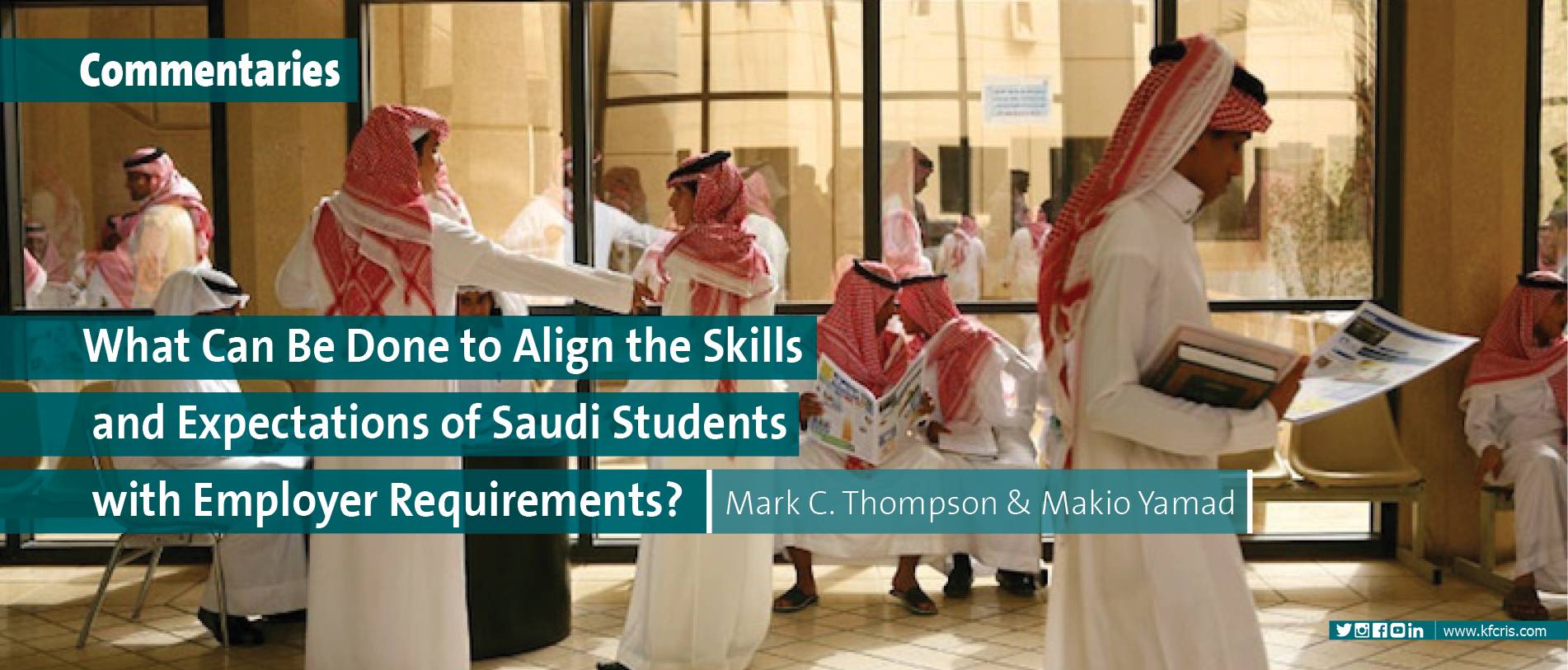Commentaries

Number:
Author: Mark C. Thompson and Makio Yamada
According to the labor market statistics for the first quarter of 2019, there were slightly less than 1.7 million Saudis working in the private sector compared to over 6.7 million expats: this puts the sector’s Saudization rate at 20%.(2) To further achieve labor localization, aligning skills and expectations of students/job-seekers with employer requirements should be a priority for policy makers. A facilitation of skills matching is integral to the Saudi economy’s transformation into a knowledge-based one; at the same time, expectations matching is also needed given that a large number of jobs currently existing in the Saudi labor ma
Number:
Author: Noura Alshehri
The anticipated visit of Russian President Vladimir Putin to the Kingdom of Saudi Arabia in 2019 is aimed at settling several mutual concerns and set to mark a new historical chapter in the relations between Moscow and Riyadh. However, the anticipation is not based solely on the fact that the Russian President will visit Riyadh for the first time since restoring relations
Number:
Author: Hesham Alghannam and Jihad Mashamoun
There was jubilation following the breakthrough in the negotiations between the Transitionary Military Council (TMC) and the Declaration of Freedom and Change Forces (DFCF), which meant that the prospects for a civilian-led council were good. However, on May 16, the head of Sudan’s Transitional Military Council, Abdel Fattah al-Burhan, dashed hopes that a transfer of power would occur soon by suspending negotiations for 72 hours, and now the TMC continues to impede such a transfer.
Number:
Author: Prof. Mark Schultz
Earlier this month Saudi Arabia celebrated World Intellectual Property Day for the first time, as the Saudi Authority for Intellectual Property (SAIP) launched a nationwide intellectual property awareness campaign.
This is an important signal of Saudi Arabia’s ambition to create a knowledge economy, vital to the economic diversification envisaged by the Vision 2030 blueprint.
“You cannot be depending on oil in a world where the knowledge economy is the driver of economic development — manufacturing is 20th century,” says Fahd Al-Rasheed
Number:
Author: Emina Osmandžiković
Since 2011 the Kingdom of Saudi Arabia has diligently worked to amend its traditional immigration and social integration system, thus developing a comprehensive approach to the reception and accommodation of displaced populations, with a special focus on displaced Syrians and Yemenis. The Kingdom has had a long history of assisting displaced populations both within and outside its borders, including the acceptance of Palestinians and Uighurs, a number of whom have become naturalized. However, nothing in this history has resulted in the creation of a comprehensive approach to regularizing displacement. Thus, the modification of the immigration
Number:
Author: Oliver McPherson-Smith
The desire to harness the power of the sun to meet Saudi Arabia’s energy needs is understandable. With intense, year-round solar radiation, as well as a vast expanse of land, the Kingdom is blessed with the physical requirements needed to take advantage of this source of renewable energy. Likewise, the opportunity cost of the countless barrels of oil that are currently used for power generation is a cause for considering alternative energy sources. While the neighboring United Arab Emirates may have taken an early lead in developing a solar generation capacity, Saudi Arabia has launched a variety of reforms and projects that are rapidly establish
Number:
Author: Joseph A. Kéchichian
China is a great and ambitious power, despite being plagued with internal problems running the gamut from poverty to racial and sectarian conflicts. Its Belt and Road Initiative (BRI), which in part strengthens Sino-Arab cooperation on political, economic, and, presumably, cultural issues—even though cooperation on cultural issues is problematic for Arab societies, which tend to be partial to Western languages and cultures—aims to emphasize Beijing’s quest for regional stability, with the aim of accomplishing the country’s global goals. Of course, because the Middle East in general, and the Arab world in particular, occupy such
Number:
Author: Makio Yamada
The development of ecosystems targeting the growth of small and medium-sized enterprises (SMEs) is one of the major challenges facing the Kingdom. Such ecosystems are indispensable to achieving what economists refer to as “inclusive growth” – economic growth, not only with high and increasing competitiveness, but also with the creation of broad employment opportunities. In this respect, it is worth paying attention to the experiences of other countries that have previously achieved such growth relatively well in order to benefit from the lessons these experiences can provide.
Number:
Author:
Dominik Krell
The Saudi legal system is on the verge of the arguably most significant transformation in its history: There are reports that Saudi Arabia will soon introduce a binding codification of Islamic law that will encompass private law, criminal law and family law. Until now, large areas of Islamic law have remained uncodified. Judges refer to Islamic jurisprudence in their judgments, which are full of references to medieval and late medieval legal treatises like Ibn Qudāma’s (d. 1223) book al-mughnī or al-Bahūtī’s (d. 1641) kashshāf al-qanāᶜ. In areas that have not been a
